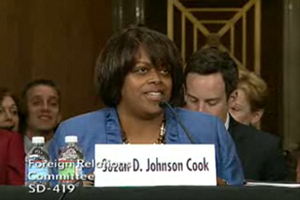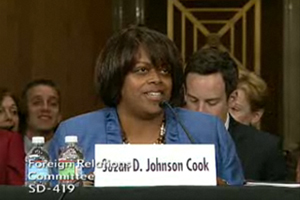A group of faith leaders sent a letter this week to the leadership of the Senate Foreign Relations Committee urging them to emphasize religious freedom in foreign policy.
The March 7 letter asks Chairman John Kerry (D-Mass.) and the ranking Republican member, Sen. Richard Lugar (Ind.), of the Senate Foreign Relations Committee to attend the confirmation of Suzan Johnson Cook as the president’s nomination for ambassador for International Religious Freedom (IRF).

“Dr. Johnson Cook’s confirmation hearing is a perfect opportunity to let the nominee and the administration know that IRF should be a high priority for the United States,” according to the letter.
The letter is signed by religious leaders from a variety of faith backgrounds including Leith Anderson, president of the National Association of Evangelicals, Susan Taylor, president of the Church of Scientology, Joel C. Hunter, senior pastor of Northland – A Church Distributed, Jim Mellado, president of the Willow Creek Association, Jim Wallis, president of Sojourners and Robert Seiple, the first U.S. ambassador-at-large for IRF. (Christianity Today Media Group editor in chief David Neff also signed the letter.)
The Senate Foreign Relations Committee has not announced a hearing to consider Cook’s nomination.
Cook was originally nominated to the position by President Obama on June 15, 2010. The letter signers said they were “disappointed by the low attendance at Dr. Johnson Cook’s first confirmation hearing last year.”
Her nomination expired at the end of the congressional session, due to the concerns of a senator who confidentially filed a hold-over letter following her hearing before the Senate Foreign Relations Committee. The senator was widely believed to be Sen. Jim DeMint (R-S.C.).
Following the start of the new congressional session, Obama re-nominated her to the position, which has remained unfilled since January 2009. Religious leaders criticized the administration for neglecting the issue of religious freedom by waiting more than a year after Obama’s election to originally nominate someone to the post.
The Washington Postnoted that “the policy Johnson Cook has been nominated to lead is being sidelined even before she takes the job” in favor of other policy initiatives. Others pointed out that Obama did not take advantage of the congressional recess to appoint Cook to the position.
“The utter indifference to this key office, and to IRF policy, by the White House and the State Department has been scandalous,” Thomas Farr, a former diplomat and current director of the Religion and U.S. Foreign Policy program at Georgetown University, wrote for CT last month.
The letter to Kerry and Lugar urges the Senate to support the importance of both the position and its function. “With strong leadership in its IRF policy, the United States could have had a much greater effect on levels of religious violence, persecution, and terrorism than it has had to date,” the letter reads.
The position of Ambassador for IRF functions as the head of the office of IRF, which is part of the State Department. The IRF office’s stated mission is to monitor religious persecution and discrimination worldwide, which is does by submitting an Annual Report on International Religious Freedom to Congress and serving as principal advisor on religious freedom to the Secretary of State. The position was created by the International Religious Freedom Act of 1998.
However, the letter cites reports that the administration may be planning to remove the IRF office from the ambassador’s direct authority, and similarly laments reports that, “while other ambassadors at large work directly under the Secretary of State, the IRF ambassador will be several levels removed from the Secretary. . . . Both of these steps would harm American interests.”









